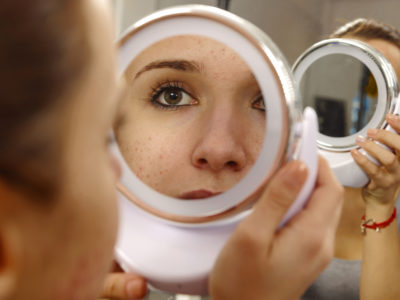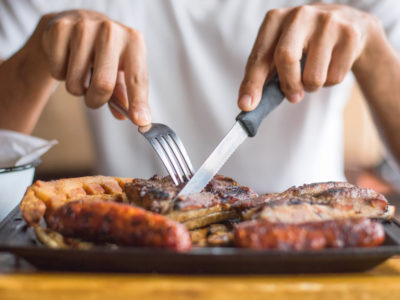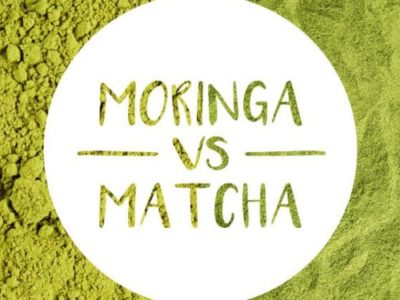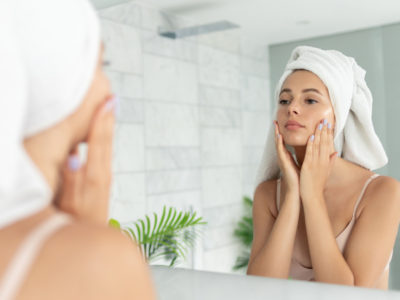Table of Contents[Hide][Show]
- Pimples Are Linked to Skin Health and Hormonal Imbalance
The Causes of Acne+−
- 1. Eating Too Much Sugar, Junk Foods, and Dairy
- The Link Between Your Gut and Healthy Skin
- 2. Too Many Late Nights
- 3. Using A Lot of Makeup Products
- 4. Stress and Anxiety
- 5. Hormonal Imbalance During Adolescence, Adulthood, or Pregnancy
- 6. Eating Too Much Non-Organic Meat
- Can Too Much Protein Cause Inflammation?
Are you interested in an Ayurvedic approach to reveal your best skin, but unsure which herbs are best for acne? Check out our list of the five top Ayurvedic herbal medicines that can get rid of this annoying skin condition.
Pimples Are Linked to Skin Health and Hormonal Imbalance
Let’s start by taking a step back and looking at the issues that lead to pimples. We’ve all had them at one time or another, but what causes them?
Pimples are related to facial skin health and hormonal imbalance and always seem to appear at the most inopportune moments. Most people try to dry out their pimples by using astringent or harsh chemical products on their face.
But, an over-secretion of sebum (your skin’s natural oil) is actually a symptom of another cause, and removing it only causes increased sebum production.
While pimples are annoying, if your experience with them is infrequent, then you don’t have much to worry about. They’ll usually go away on their own if left alone.
If however they never seem to really go away or you experience frequent breakouts, then you are likely suffering from acne, a skin condition where the hair follicles under the skin become clogged with oil and dead skin cells. Clogged pores are what typically causes breakouts of pimples, pustules (whiteheads), and blackheads. These breakouts typically occur on the face, but can occur all over the body.
The Causes of Acne
Acne can be caused by a number of different lifestyle habits and health issues, according to Dr. MS Krishnamurthy MD (Ayu), Ph.D. (Ayu) and Dr. Hebbar. These Ayurvedic practitioners point to the following potential causes.
1. Eating Too Much Sugar, Junk Foods, and Dairy
You might be wondering why eating these foods can lead to acne.
Dairy and foods high in sugar (high-glycemic foods) play a role in regulating certain hormones—insulin and androgens—that are known to cause acne flare ups.
A diet high in sugar, dairy, and processed foods can also lead to an imbalance in the gut’s microflora, known as dysbiosis. When this occurs, the bad bacteria in your body (pathogens) can outnumber the good bacteria (probiotics), leading to a number of issues and illnesses, many of which directly impact the skin such as acne and eczema.
In Ayurveda, consuming these types of foods can cause an unbalance of the doshas, which are biological energies within the body.
There are three types of doshas that negatively affect the skin and lead to acne: Kapha (earth and water dosha), Pitta (fire and water dosha), and Vata (air and space dosha). The imbalance of these three doshas can cause illnesses and acne.
Related
The Link Between Your Gut and Healthy Skin
Good Skin From Within The story is all too common. You have the perfect skincare routine, the best lotions and potions, you keep up to date all the latest tips and trends, but you still have issues with your skin. It’s not your fault, trust us. It’s your gut’s. The skincare industry would love for …
2. Too Many Late Nights
Sleeping is the time when your body recharges itself, and a lack of sleep negatively affects your body in various ways. Your sleeping habits can help or harm your skin condition.
Sleeping late, for example, can interfere with the repair and detoxification process of the body, which typically occurs from 11 PM to 2 AM is where this process takes place.
If you don’t sleep before 11 PM, the healing period cannot work properly, which may lead to several health and skin issues, such as acne.
3. Using A Lot of Makeup Products
Using too much makeup can trigger breakouts and oftentimes the ingredients in the makeup formulation are the culprits.
Products with fragrances and dyes, for example, can cause skin irritation for people with acne-prone and sensitive skin because the chemicals might be too strong for them.
Alcohol in makeup products can also lead to acne. Manufacturers use alcohol to allow makeup to penetrate into the skin, but this is a drying compound that can lead to skin irritation and dehydration, which triggers acne.
4. Stress and Anxiety
Stress and anxiety may also contribute to the development of acne. Research shows there is a relationship between acne flare-ups and stress.
Acne might be the result of your body’s response to stress. When this happens, your body releases androgens, hormones responsible for stimulating hair follicles and the skin’s oil glands.
If you are under constant stress, the levels of androgens increase. Stress can also worsen the symptoms and can result in mild to moderate acne or even severe acne if you are already suffering from it.
5. Hormonal Imbalance During Adolescence, Adulthood, or Pregnancy
Hormonal acne happens when there are changes in hormone production and function. Typically, the rise in androgens is the main reason why acne develops.
High levels of the hormone can stimulate the production of more sebum in the skin, which can result in zits and acne when left uncontrolled. Sebum can clump dead skin cells in the pores, which causes clogging and leads to inflammation related to acne.
6. Eating Too Much Non-Organic Meat
The processing of pork, beef, and poultry can be a problem when it comes to your skin. Non-organic meat in particular is highly-processed and may contain high amounts of antibiotics to keep animals healthy in overcrowded farming conditions.
Antibiotics can disrupt the balance of the good and bad bacteria in the gut, which weakens the immune system, making you prone to bacteria-causing acne from your surroundings. If you are going to consume meat, choose organic as much as possible and incorporate probiotic-rich foods and supplements to help strengthen your digestive health. (Our favorite probiotic supplement is Just Thrive Probiotic.)
Related
Can Too Much Protein Cause Inflammation?
Too much protein can hurt your body in more ways than one. Learn how it increases your risk of inflammation below.
The 5 Best Ayurvedic Herbs for Acne
How do Ayurveda herbs for acne help in treating the skin condition?
Ayurveda is an ancient herbal medical system from India that emphasizes prevention and maintaining health through mind-body balance, diet, and the use of herbs.
The Ayurveda herbs below, which may be present as ingredients in many herbal products, can be applied topically (as a lotion, ointment, or essential oil) or taken orally in many cases. (Consult your dermatologist or general practitioner before starting any new health regimen.)
1. Neem
Neem (Azadirachta indica) has been used as a traditional medicine for over 5,000 years. This Ayurvedic herbal medicine for acne-prone skin is an evergreen tree found throughout India and has many healing powers, including strengthening the immune system and helping heal acne.
Because neem is a blood purifier and detoxifier, it works well as a cleanser for your system and your skin. It’s also antibacterial, antioxidant, and anti-fungal and reduces inflammation, so it’s perfect for pimples that don’t seem to go away.
If you’re also looking for a topical preparation to make at home, making a neem toner couldn’t be easier. Remember to find the best quality neem powder or leaves you can afford and follow these instructions:
- Boil two leaves or less than 1/8 teaspoon of powder in a ½ liter of spring water (or other good-quality water) until the water goes green.
- Allow it to cool, strain, and then store the liquid in a glass bottle.
- Dip an organic cotton ball or pad into it after cleansing and apply it over your face gently. You can do it twice a day or as needed.
2. Ashwagandha
Ashwagandha (Withania somnifera) is also a popular Ayurveda herb as it can correct your hormonal imbalance, calm your skin, and reduce blemishes. Plus, it’s great for stress reduction!
Otherwise known as Indian ginseng, it’s an adaptogen that acts as an overall health tonic, but it’s great for acne because it is antiseptic, antimicrobial, and anti-inflammatory. These properties help to heal acne lesions and other small skin wounds while also reducing skin inflammation (bye-bye redness!).
If you have been trying to improve your skin’s texture and health, Ashwagandha can help you combat dry skin with its moisturizing effects.
Why not try taking Ashwagandha orally? It will help with your skin, your overall health, and stress levels.
Always follow the recommended dosage or applications for best results.
3. Moringa
Moringa (Moringa oleifera) is a super skin nutrient agent. This herbal acne treatment is full of protein, vitamins A, C, and E, beta-carotene, and phenolics.
This Ayurvedic herb has also been used for millennia—in fact, the ancient Egyptians placed vases of valuable moringa oil in their tombs. The oil is said to clear acne-prone skin, firm skin, promote elasticity, reduce pore size, and boost radiance when applied topically.
Don’t forget that many herbs deliver most of their benefits when mixed with a liquid and swallowed!
Moringa also helps with wound healing, and it’s an anti-fungal and antibacterial herb. This hydrating, detoxifying powerhouse should certainly be featured in your daily nutritional and facial routine if you’re looking for clearer skin.
Moringa leaves are added to many cosmetics. If you’d like to make a purifying mask, find some moringa powder and follow these instructions:
- Mix it with a small amount of organic rose water to make a paste.
- Apply and leave it on your skin for five minutes, and then wash it off with warm water. Try this once a week before bedtime.
Related
The Battle Of The Greens: Moringa vs. Matcha
Some super greens are worth drinking, but when it comes to moringa vs. matcha, which is better for overall health and wellness? Find the answer below!
4. Shatavari
Shatavari (Asparagus racemosus) is the main Ayurvedic rejuvenating female tonic, according to Kate Magic of Raw Living EU. It’s a wide form of asparagus used for thousands of years by women of all ages.
Shatavari offers soothing, restorative relief from premenstrual syndrome (PMS), menstrual, and menopausal imbalances. It works like dong quai, wild yam, raspberry leaf, and evening primrose.
Indeed, a scientific study shows it has been used effectively to reduce premenstrual syndrome, which is a great benefit for anyone with hormone-related acne–plus the headaches, bloating, tender breasts, and other symptoms associated with PMS.
Shatavari root comes as an organic powder. Add it to your acne arsenal for perfectly balanced hormones.
5. Kutki
Kutki (Picrorhiza kurroa) is another bitter tonic herb recommended by Ayurvedic practitioners in the treatment of acne. It’s known for its liver detoxifying properties.
It’s a Pitta pacifier, so it’s cooling and cleansing which is great news for the hot, red, inflammatory nature of pimply skin.
For clearer skin, you can take a ½ teaspoon of it with a 172-degree cup of hot water before breakfast every morning. It’s also synergistic with turmeric, and a 1:1 ratio of each herb works well.
If you can’t stand the flavor, add a little raw honey to mellow the bitterness.
Although kutki and its compounds are already being used in the medical industry, bear in mind that it is an endangered herb, so support organic sources and use it sparingly. It can be sourced through Ayurvedic doctors and supply stores.
Closing Thoughts
Ayurveda herbs are wonderful natural skincare options because they’re not only beneficial in the treatment of acne vulgaris, but can provide other health benefits, too. They are safe to use in most cases and are more cost-effective than purchasing over-the-counter, non-herbal medicines at the drugstores.
Try these Ayurveda herbs for acne at home and see the best results yourself!
You May Also Like…
Editor’s Note: This post was originally published on November 4, 2016, and has been updated for quality and relevancy most recently on June 16, 2021.







